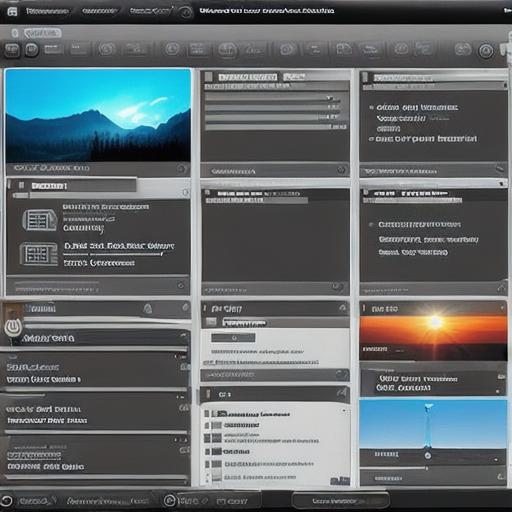The Top Marketing Tools for Small Businesses: Boosting Your Online Presence and Engaging Customers
If you’re a small business owner, you know the importance of marketing your products or services effectively to attract and retain customers. However, with so many different marketing tools available, it can be overwhelming to choose the right ones for your business. In this article, we will explore some of the top marketing tools recommended for small businesses, including SEO optimization techniques, social media marketing, email marketing, content marketing, and more. By using these tools effectively, you can boost your online presence and engage customers in a meaningful way.
1. Search Engine Optimization (SEO)
Search engine optimization (SEO) is the process of optimizing your website’s content to rank higher in search engine results pages (SERPs). This is crucial for small businesses because it increases the visibility of your website and attracts more potential customers to your business. Here are some tips on how to optimize your website for SEO:
Conduct keyword research: Identify the keywords that your target audience uses when searching for products or services related to your business. Use these keywords strategically throughout your website’s content, including headings, meta tags, and descriptions.
Optimize images: Ensure that all images on your website include descriptive file names and alt tags with relevant keywords. This helps search engines understand what the image is about and can improve its ranking in SERPs.
Improve website speed: A slow website can lead to higher bounce rates and lower search engine rankings. Use tools like Google’s PageSpeed Insights to identify areas for improvement, such as optimizing images and reducing HTTP requests.
Build high-quality backlinks: Backlinks from reputable websites can improve your website’s authority and ranking in SERPs. Reach out to other businesses and blogs in your niche to request a link back to your website in exchange for sharing their content or providing valuable information.
- Social Media Marketing

Social media marketing is an effective way for small businesses to connect with customers, build brand awareness, and drive traffic to their website. Here are some tips on how to use social media marketing effectively:
Choose the right platforms: Not all social media platforms are created equal. Identify which platforms your target audience is most active on and focus your efforts there. For example, if your business targets millennials, Instagram and TikTok may be the best platforms for you.
Develop a content strategy: Create a content calendar to plan out what types of posts you will create (photos, videos, blog posts, etc.) and when you will post them. This can help you stay organized and ensure that you are consistently providing valuable content to your followers.
Engage with your audience: Respond to comments and messages promptly and authentically. This helps build trust and encourages customers to engage with your business more frequently.
Use paid advertising: Consider using paid social media advertising to reach a larger audience and drive more traffic to your website. Platforms like Facebook Ads and Instagram Ads offer targeted advertising options that allow you to reach users based on their interests, behaviors, and demographics.
- Email Marketing
Email marketing is a cost-effective way for small businesses to communicate with customers and keep them engaged with your brand. Here are some tips on how to use email marketing effectively:
Build an email list: Collect email addresses from customers through lead magnets, pop-ups, or opt-in forms. Ensure that you are collecting emails legally and in compliance with data protection regulations.
Segment your email list: Divide your email list into different segments based on factors like interests, behaviors, and demographics. This allows you to send targeted and relevant content to each segment.
Create engaging content: Use a variety of content formats, such as images, videos, and blog posts, to keep your emails interesting and engaging.
Monitor open and click-through rates: Track how many people are opening and clicking on your emails to identify what is working well and what needs improvement.
Offer exclusive discounts or promotions: Use email marketing to offer exclusive discounts or promotions to incentivize customers to make a purchase or take another desired action.
- Content Marketing
Content marketing involves creating and sharing valuable content, such as blog posts, videos, and infographics, to attract and retain customers. Here are some tips on how to use content marketing effectively:
Define your target audience: Identify who your ideal customer is and what type of content they are interested in. This can help you create content that resonates with them and drives more engagement.
Develop a content plan: Create a content calendar to plan out what types of content you will create, when you will publish it, and where you will share it. This can help you stay organized and ensure that you are consistently providing valuable content to your audience.
Use SEO techniques: Optimize your content for search engines by using relevant keywords, creating compelling meta descriptions and headings, and including internal and external links.
Measure your results: Track how your content is performing by monitoring engagement metrics, such as page views, shares, and comments. This can help you identify what type of content is driving the most engagement and adjust your strategy accordingly.
- Video Marketing
Video marketing involves creating and sharing videos to engage customers and promote your brand. Here are some tips on how to use video marketing effectively:
Define your target audience: Identify who your ideal customer is and what type of videos they are interested in. This can help you create videos that resonate with them and drive more engagement.
Plan your content: Develop a content plan for your videos, including topics, formats, and publishing schedules. This can help you stay organized and ensure that you are consistently providing valuable content to your audience.
Use social media platforms: Share your videos on social media platforms like YouTube, Facebook, and Instagram to reach a wider audience. Consider using paid advertising to promote your videos to users who may not have discovered them organically.
Optimize for search engines: Use relevant keywords in your video titles, descriptions, and tags to improve its visibility in search engine results pages (SERPs).
- Influencer Marketing
Influencer marketing involves partnering with social media influencers or bloggers to promote your products or services to their followers. Here are some tips on how to use influencer marketing effectively:
Identify the right influencers: Look for influencers who have an engaged and relevant audience that aligns with your target market. Consider working with micro-influencers, who may have smaller followings but higher engagement rates.

Develop a clear strategy: Define the goals of your influencer marketing campaign, such as increasing brand awareness or driving sales, and create a plan for how you will measure success. This can help ensure that your campaign is aligned with your overall business objectives.
Ensure authenticity: Partner with influencers who are genuine and passionate about your products or services. Avoid working with influencers who only promote your product in exchange for payment, as this can damage your brand’s reputation.
Monitor and measure results: Track the performance of your influencer marketing campaign by monitoring engagement metrics, such as likes, comments, and shares. This can help you identify which influencers are driving the most engagement and adjust your strategy accordingly.
- Affiliate Marketing
Affiliate marketing involves partnering with affiliate marketers to promote your products or services and earn a commission on sales made through their referrals. Here are some tips on how to use affiliate marketing effectively:
Find the right affiliates: Look for affiliate marketers who have an engaged audience that aligns with your target market. Consider working with niche-specific affiliates who specialize in promoting products within your industry.
Develop a clear strategy: Define the goals of your affiliate marketing campaign, such as increasing sales or driving traffic to your website, and create a plan for how you will measure success. This can help ensure that your campaign is aligned with your overall business objectives.
Offer competitive commissions: Ensure that your commission rates are competitive within your industry to attract and retain affiliates. Consider offering tiered commissions based on the number of sales made through their referrals.
Monitor and measure results: Track the performance of your affiliate marketing campaign by monitoring conversion rates, sales, and revenue generated through affiliate referrals. This can help you identify which affiliates are driving the most sales and adjust your strategy accordingly.
In conclusion, small businesses have a wide range of marketing options available to them, but it’s important to choose the right strategies based on your target audience and business goals. By using a combination of these tactics, businesses can drive more traffic, increase engagement, and ultimately grow their revenue.




